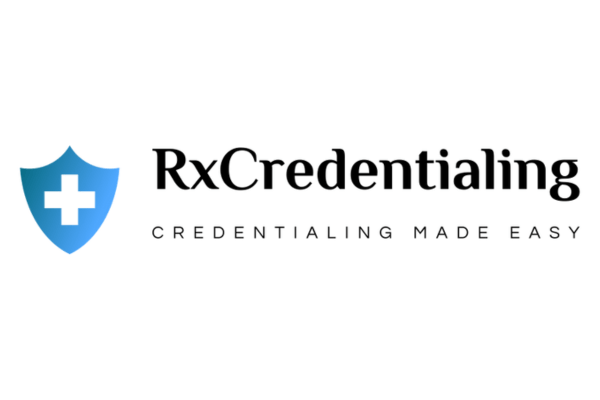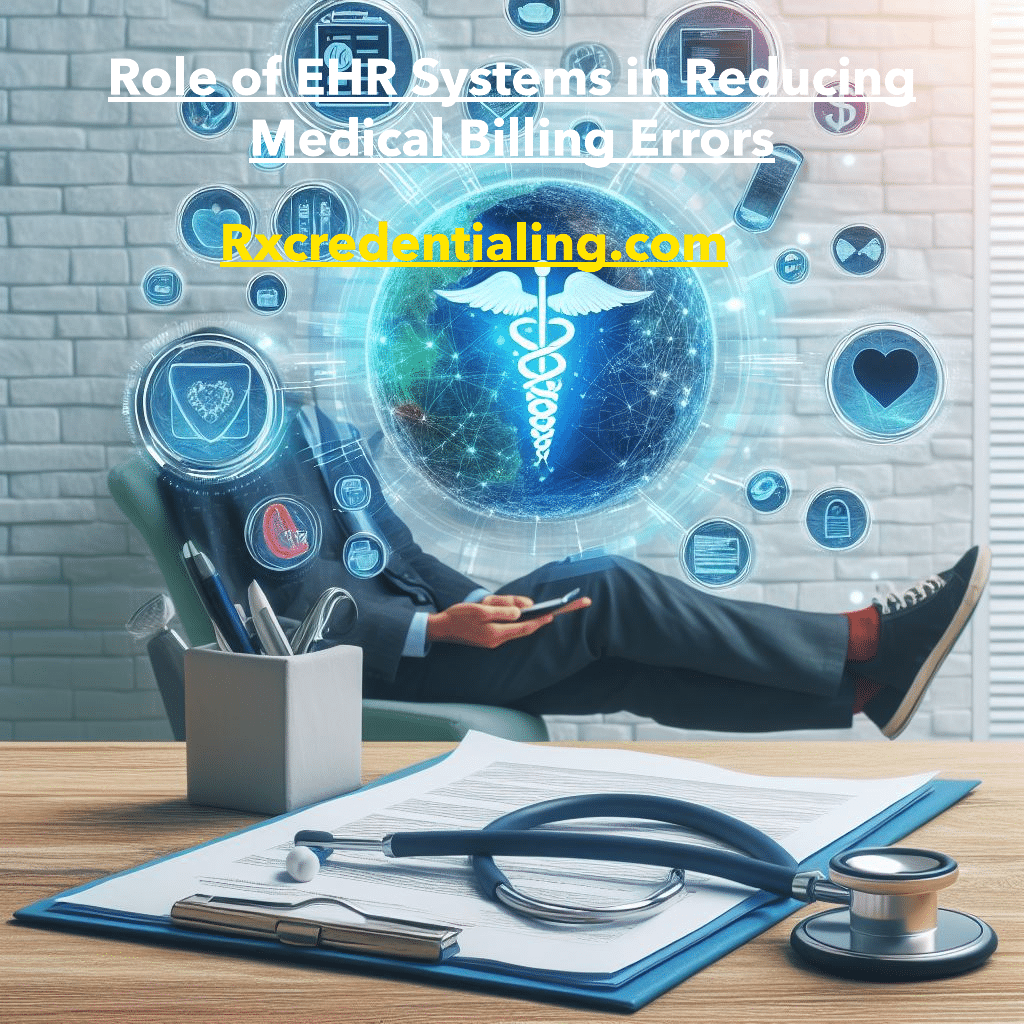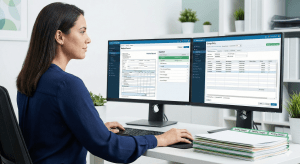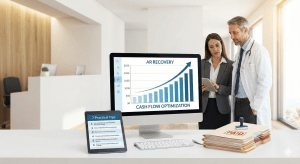Understanding the Role of EHR Systems in Healthcare
As you’re diving deeper into the healthcare sector, you may have encountered a term – Electronic Health Records (EHR) Systems.
But what does it mean? EHRs are digital versions of patient health information. This information usually consists of medical history, immunizations, medications, and test results.
Hospitals and clinics globally are adopting this technology to streamline healthcare processes, ensuring efficiency and effectiveness.
The importance of these systems cannot be overstated. They play a crucial role in enhancing the quality of patient care, improving healthcare delivery, and reducing medical errors.
By maintaining an organized and updated digital record of patients’ medical history, EHRs provide healthcare providers with better data and insights for treatment.
Let’s delve deeper into a specific area where EHR Systems can be a game changer – Medical Billing.
Yes, you heard it right! By simplifying the journey from patient check-in to invoice generation, EHRs can significantly alleviate the challenges of medical billing.
| Benefits | Description |
|---|---|
| Minimizing billing errors | By automating the billing process, EHRs reduce the chances of manual entry errors which can lead to costly billing mistakes. |
| Ensuring billing compliance | EHR systems keep up-to-date with the latest coding and billing regulations, reducing the risk of non-compliance. |
| Faster invoice generation | Integrated EHR and billing systems can considerably cut down the time taken to generate and send invoices to patients or insurance companies. |
Through EHRs, healthcare providers can achieve greater accuracy in their billing processes, optimizing the revenue cycle and ultimately enhancing patient satisfaction.
Stay tuned to grasp deeper insights into how EHRs are revolutionizing the healthcare billing landscape!
The Influence of EHR Systems on Medical Billing Processes
Electronic Health Record (EHR) systems are revolutionizing the landscape of medical billing. For one, they automate many tedious processes that were previously handled manually.
This alone significantly reduces the likelihood of human errors that can lead to incorrect patient invoices. Let’s delve further into how EHR systems orchestrate this.
Through structured data entry enforced by EHR systems, uniform and consistent patient information can be ensured.
This greatly reduces chances of misinterpretation of data. According to a study, this standardization can reduce coding errors by up to 78%.
EHR systems also automate the process of billing code selection, thus evading issues of ‘upcoding’ or ‘undercoding’.
Upcoding refers to the practice of billing for a more expensive service than the one actually provided, while undercoding is not billing for a service that was provided or billing for a lesser service.
Research shows that this can decrease billing errors by up to 60%.
Another impressive facet of EHR systems in aiding billing accuracy is through real-time, automated checking of patient coverage with insurance companies.
By having an immediate understanding of what the patient’s insurance covers, healthcare providers can avoid billing for procedures or treatments not covered.
| Steps in Medical Billing | Without EHR | With EHR |
|---|---|---|
| Accurate data entry | Chances of manual errors | Structured, uniform data entry minimizes errors |
| Billing code selection | Potential for upcoding or undercoding | Automated process reduces this likelihood |
| Verifying patient coverage | Manually contacting insurance providers; errors can occur | Real-time, automated checking reduces billing discrepancies |
In summary, EHR systems influence medical billing processes positively by reducing the likelihood of human errors, helping streamline operations and establish a more accurate and efficient medical billing system.
How EHR Systems Streamline Medical Billing
You may be wondering just how EHR systems simplify the often knotty area of medical billing. Well, you’re in for a pleasant surprise!
Through innovative automation and meticulous record-keeping, EHRs have a significant hand in streamlining the billing process.
Firstly, EHRs eliminate the possibility of losing patient information, as everything is digitally stored.
No more missing files or unreadable handwriting causing confusion.
All necessary billing information is collected and stored accurately in a singular, centralized location. This access can be especially useful in maintaining billing chain consistency.
Research supports this, highlighting the benefits of electronic systems in maintaining patient records uninterrupted.
Moreover, EHR systems are equipped with advanced coding capabilities.
They offer modern capabilities for DRGs (Diagnosis-Related Groups) and CPT (Current Procedural Terminology) coding, which are key for accurate billing.
In essence, these features ensure that services provided are accurately documented and charged.
| Advantages of Using EHR for Billing | |
|---|---|
| Accurate Medical Coding | Reduces Risk of Billing Errors |
| Centralized Data | Enhances Audit Preparedness |
The ability of EHR systems to flag potential billing errors before they happen is another significant advantage.
They can identify discrepancies between a patient’s recorded diagnosis and the treatment provided, avoiding incorrect invoicing.
It’s like having an eagle-eyed auditor who constantly supervises the billing process in real-time. Can you envision the reduction in billing errors?
Finally, an added bonus is the speed at which billing can be done using an EHR system.
Compared to manual methods where claims may take days to process, EHRs enable instantaneous submission of medical bills, accelerating the payment process and helping maintain a steady cash flow for healthcare providers. How phenomenal is that!
Through all of these beneficial features, EHR systems are more than just digital patient charts.
They have the capacity to streamline billing, minimizing errors and facilitating a more efficient, more manageable process overall. And it’s all supported by evidence!
Reducing Medical Billing Errors: The EHR Approach
Of course, reducing medical billing errors is no small feat. Studies have shown that approximately 80% of medical bills contain some form of error.
These mistakes can lead to inefficiencies, unnecessary costs, and can even compromise patient care. But with Electronic Health Records (EHR) systems the scenario is quite different. EHRs, you have probably realized by now, are much more than just digital versions of paper charts. They come armed with potent features that help prevent billing errors.
These systems not only store patient medical history, diagnoses, medications, treatment plans and test results, but they also track billing information to ensure everything matches up.
For instance, imagine a scenario where a patient visits a doctor and is prescribed a medication. The prescription gets entered into the EHR system.
When it comes time to invoice, the system checks whether the doctor’s visit, diagnosis, and chosen medication correspond. Let’s break down how EHRs address some common types of billing errors.
| Type of Billing Error | How EHR Systems Address It |
|---|---|
| Upcoding | EHRs prevent upcoding errors by only allowing procedures that align with the documented diagnosis and treatment. |
| Duplicate Billing | EHRs prevent duplicate billings by checking for duplicate entries before the claim is submitted. |
| Unbundling | EHRs bundles tasks that are generally billed together, preventing unbundling errors. |
| Incorrect Patient Information | EHRs contain comprehensive patient data that can be easily verified and corrected if needed, reducing errors due to incorrect patient details. |
Strategies for Minimizing Billing Errors with EHR Systems
Imagine miscalculations or other errors slipping into medical bills. Such billing inaccuracies can result in inflated costs, harm customer relations, and even lead to legal complications.
Electronic Health Record (EHR) systems, when correctly utilized, can significantly lower the occurrence of these errors. Let’s delve into the strategies for achieving this.
First on the list is standardization of the billing process. EHRs can automate invoicing, following a predefined, uniform protocol.
This automation cuts out the room for error that comes with manual data entry, and ensuring each patient’s invoice is calculated using the same parameters. Research underlines the benefits of EHR for procedure standardization.
Real-time error detection is another advantageous component of these platforms.
EHR systems check for potential billing errors, such as eligibility mishaps or incorrect data, before the invoice is dispatched.
Immediate detection and rectification prevent errors from reaching the patient, which improves satisfaction rates and saves time untangling inaccuracies later.
Consider also the use of comprehensive patient data to improve billing accuracy.
EHR systems integrate various medical records into a complete, straightforward profile.
This highly organized, all-encompassing bank of patient history, treatments, and charges leaves no room for misinterpretation, ensuring billing accuracy.
The Office of National Coordinator for Health Information Technology further elaborates on EHR capabilities.
Lastly, the utilization of analytics can underline areas of common error, providing insight for process improvement.
EHR systems often include reporting capabilities that can highlight patterns of recurrent issues, prompting exploration and resolution of the root causes.
| Strategy | Benefit |
|---|---|
| Standardization of billing process | Reduces errors resulting from manual data entry |
| Real-time error detection | Prevents billing errors from reaching patients |
| Comprehensive patient data | Ensures all charges are accounted for, minimizing potential discrepancies |
| Utilization of analytics | Highlights areas of recurrent issues for targeted improvement |
And so, by leveraging the power of EHR systems, one can reduce billing errors significantly, resulting in accurate patient invoicing, greater customer satisfaction, and improved revenue cycle management.
Benefits of EHR Systems in Enhancing Billing Accuracy
Have you ever considered how Electronic Health Record (EHR) systems improve the billing process?
Sit back as we explore how these technological tools play a crucial role in ensuring that the billing process is accurate and error-free.
Foremost, EHR systems automatically capture all services rendered during a patient’s encounter. This means that there are almost zero chances of omitting billable services or double billing for the same service.
The automated tracking of services prevents financial loss to the healthcare provider while ensuring the patient’s invoice is accurate.
The next nugget of EHR supremacy comes into play as these systems enhance charge capture. By coding and mapping every service directly to its appropriate charge, EHR systems eliminate the guesswork from the billing process.
Thereby, it reduces any chance of undercharging or overcharging the patient.
Moreover, EHR systems speed up billing cycles through their real-time function. Healthcare providers get to prepare and send out bills immediately after the service, thus improving cash flow. Moreover, it improves patient satisfaction as they are quickly informed about their invoices.
The integration of EHR systems also promotes transparency between patients and healthcare providers. By providing clear explanations of their invoice, these systems ensure that the patient is fully aware of why and what they are being charged for.
This transparency improves the likelihood of prompt payment and reduces disputes.
In conclusion, EHR systems are indispensable tools for improving billing accuracy and patient invoicing. So don’t wait! Embrace this technology to enhance efficiency and accuracy in your healthcare facility’s billing process.
Enhancing Revenue Cycle Management with EHR Systems
Let’s dive further into how Electronic Health Records (EHR) systems can revolutionize Revenue Cycle Management (RCM).
The integration of EHR systems into RCM processes is a strategic move for all healthcare providers seeking greater intricacies in invoicing, claims management and financial reporting.
One way EHR systems enhance RCM is through their unique ability to scale down billing errors by automating charge capture.
This feature allows providers to easily and accurately record each service provided, thus turning potentially lost revenues into profitable ones.
Being truly effective RCM tools, EHR systems also support denial management.
Any rejected or contested claim can be quickly identified, analyzed, and corrected, speeding up the claim remittance process.
Perhaps one of the most significant advantages brought forth by EHR systems is their capability to offer comprehensive financial reports.
Such reports provide healthcare providers with valuable insights into their financial health, allowing them to make informed decisions that optimize their cash flow.
| EHR Function | Benefits to RCM |
|---|---|
| Automated Charge Capture | Minimizes slipped charges and boosts revenue. |
| Denial Management | Speeds up claim resolution and improves cash flow. |
| Financial Reporting | Offers insights to guide financial decisions, optimizing revenue. |
Simply put, the synergy between EHR systems and your Revenue Cycle Management can bring about a sea change in not just the accuracy of patient invoicing, but also the overall financial well-being of your healthcare organization.





